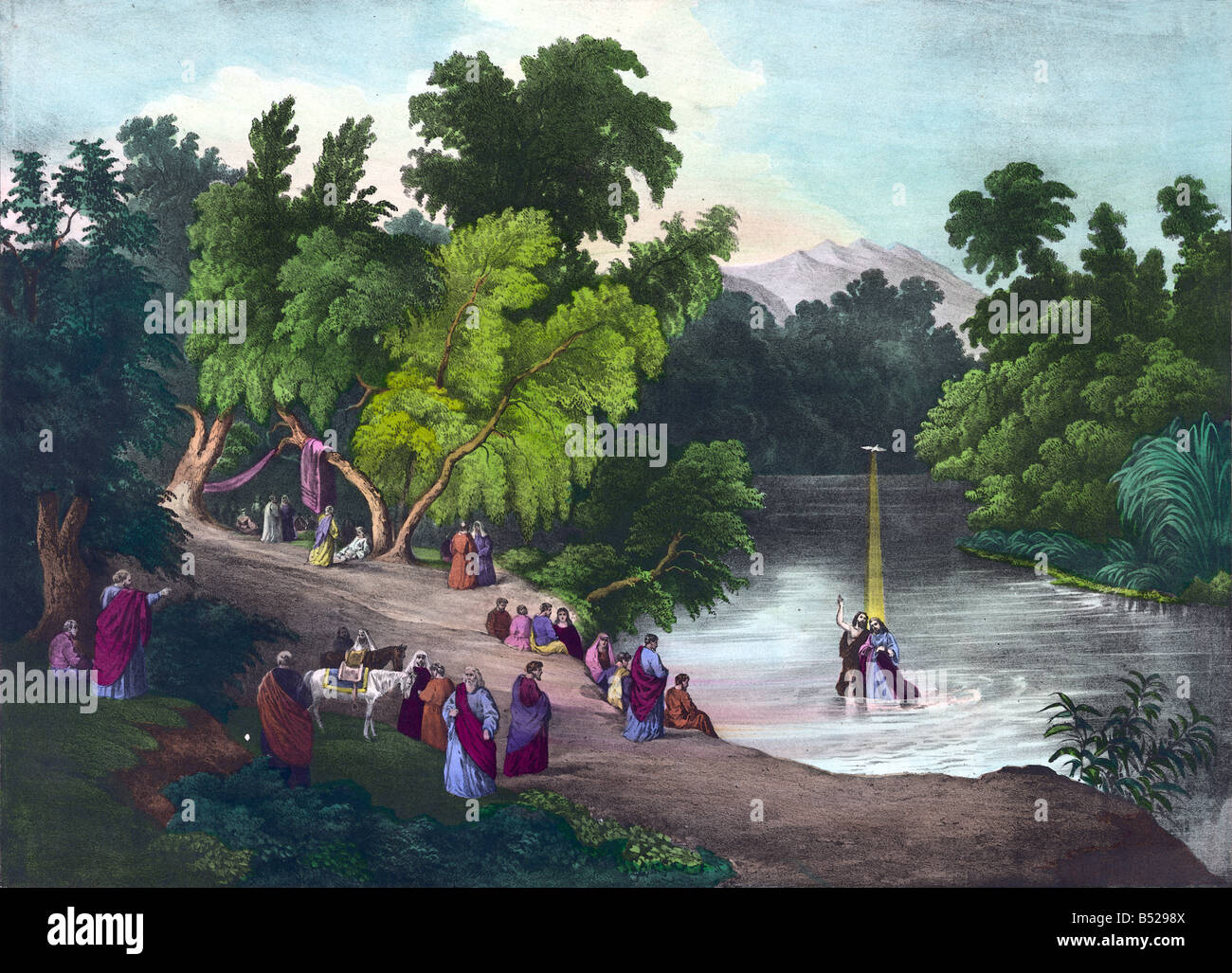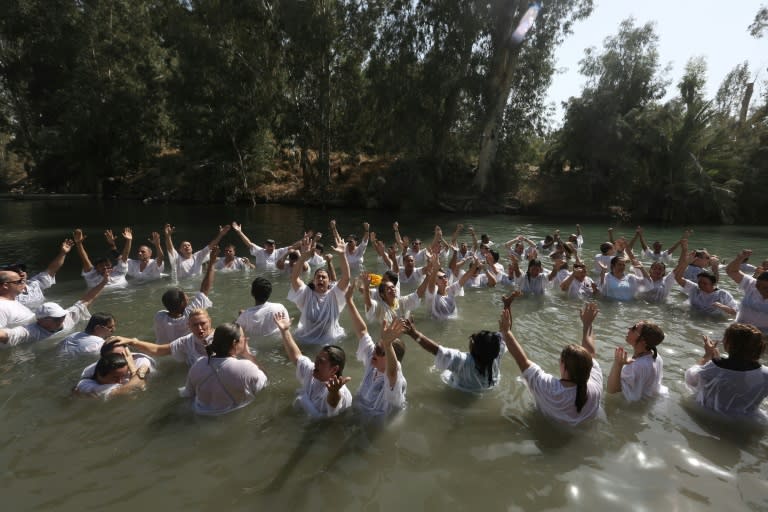Jordan River Revelation: Discover Christ's Baptism

The Jordan River holds great significance in Christian history and is believed to be where Jesus was baptized by John the Baptist. This sacred river attracts millions of pilgrims each year who come to walk in the footsteps of Jesus and experience a spiritual connection to their faith. In this blog, we will explore the background of the Jordan River and the importance of Christ's baptism on this holy site.
Background on the Jordan River and its significance in Christian history
- The Jordan River is a 156-mile-long river that flows through the Sea of Galilee and eventually ends in the Dead Sea.
- It holds immense religious and historical significance for both Jews and Christians.
- The Jordan River is mentioned multiple times in the Bible, most notably when the Israelites crossed it to enter the Promised Land.
- The river has been a place of ritual cleansing and purification for centuries.
- According to Christian tradition, it is believed to be the same river where Jesus was baptized by John the Baptist.
Importance of Christ's baptism in the Jordan River
- Christ's baptism in the Jordan River began his ministry and public proclamation as the Messiah.
- It is seen as a powerful act of humility and obedience, as Jesus submitted to John's baptism even though he was sinless.
- The event also demonstrates the role of John the Baptist as a prophet preparing the way for Jesus.
- Christ's baptism in the Jordan River is an example for Christians today, reminding them of the importance of repentance, forgiveness, and the indwelling of the Holy Spirit.
- Pilgrims worldwide visit the Jordan River to renew their faith, reaffirm their commitment to Christ, and seek spiritual healing.
The Jordan River holds deep spiritual significance in Christian history. Christ's baptism in this sacred river symbolizes humility, obedience, and repentance. Pilgrims worldwide are drawn to the Jordan River to experience the spiritual connection to their faith and to remember Christ's example. Visiting this holy site allows believers to reflect on their baptism and renewal of faith.

Location and Description of the Jordan River
Geographical location of the Jordan River
- The Jordan River is located in the Middle East and flows through the Sea of Galilee, ultimately ending in the Dead Sea.
- It forms the border between Jordan and Israel, and its waters are shared by both countries.
- The river has played a significant role in the region's history and is an important source of freshwater for the surrounding areas.
Physical characteristics of the Jordan River
- The Jordan River is approximately 156 miles long and varies in width, ranging from 6 to 30 meters.
- It flows through a diverse landscape, including mountains, valleys, and desert areas.
- The river has a significant drop in elevation, descending from about 1,200 feet above sea level at the Sea of Galilee to about 1,400 feet below sea level at the Dead Sea.
- The water of the Jordan River is relatively shallow, especially in certain sections, making it accessible for pilgrims to immerse themselves during religious ceremonies.
- Due to its location in arid regions, the river's water flow is affected by fluctuating seasonal rainfall.
Visiting the Jordan River provides an opportunity to witness the region's natural beauty and connect with its historical and religious significance. The tranquil waters and picturesque surroundings create a peaceful contemplation and spiritual reflection atmosphere. Pilgrims often gather at specific spots along the riverbanks to partake in rituals and seek a deeper connection with their faith.
It is important to respect the sacredness of the Jordan River and follow any specific guidelines or instructions provided by local authorities or religious leaders when visiting. The experience of being in the presence of such a significant site can be humbling and inspiring, allowing individuals to reflect on their spiritual journey and find solace in their peaceful surroundings.
Whether you are a devout Christian or simply interested in exploring the historical and cultural aspects of the region, a visit to the Jordan River is a unique and profound experience that leaves a lasting impression on all who encounter its sacred waters.
Importance of Christ's Baptism
Symbolism and spiritual significance of baptism
Baptism is a significant religious ceremony with great symbolism and spiritual importance for Christians. It represents a cleansing of sins and a new beginning, as the individual is immersed in water, symbolizing their burial with Christ and resurrection to a new life.
For Christians, baptism is an act of faith and obedience to God's command. It is often viewed as how an individual publicly declares their commitment to follow Jesus Christ and become a part of the Christian community.
The Jordan River, where Jesus Himself was baptized by John the Baptist, holds deep spiritual significance in this context. Jesus's baptism symbolized His identification with humanity and the beginning of His public ministry. It was a moment when the Holy Spirit descended upon Him, affirming His divine nature and marking the start of His mission on earth.
Connection between Christ's baptism and the concept of redemption
Christ's baptism is also linked to the concept of redemption in Christianity. Through His baptism, Jesus willingly took upon Himself the sins of humanity, foreshadowing His ultimate sacrifice on the cross for the salvation of mankind.
By immersing Himself in the waters of the Jordan River, Jesus embraced the weight of humanity's sins, prefiguring the crucifixion where He would bear the full burden of sin and offer redemption to all who believe in Him. His baptism thus serves as a powerful reminder of His mission to reconcile humanity with God and bring about salvation.
Furthermore, Christ's baptism serves as an example for believers to follow. Just as Jesus sought baptism to fulfil all righteousness, Christians are encouraged to follow His example and undergo baptism as a public declaration of their faith and commitment to live according to God's teachings.
Christ's baptism in the Jordan River holds immense importance for Christians. It symbolizes cleansing, rebirth, and identification with Christ. It also highlights the concept of redemption and is a powerful example for believers to follow. The Jordan River becomes a sacred site where individuals can reflect on the significance of their baptism and find spiritual inspiration in the footsteps of Jesus.

The Role of John the Baptist
John the Baptist's role in baptizing Jesus
John the Baptist played a crucial role in the baptism of Jesus. He was the forerunner, sent to prepare the way for the Messiah. John's ministry centred around baptism and his message of repentance, proclaiming the coming of the kingdom of God.
When Jesus approached John to be baptized, John initially felt unworthy to baptize Him, recognizing Jesus' divine nature. However, Jesus insisted, stating that it was necessary to fulfil all righteousness. In this act, John humbly baptized Jesus in the Jordan River, marking the moment Jesus' public ministry began.
This baptism symbolized Jesus' identification with humanity and His willingness to take on the world's sins. It was also a moment of divine revelation as the Holy Spirit descended upon Jesus, affirming His unique relationship with God.
The significance of John the Baptist's message of repentance
John the Baptist's message of repentance was a key component of his ministry and had profound significance for those who heard it. He called people to turn away from their sins and prepare their hearts for the coming of the Messiah.
By emphasizing repentance, John emphasized the need for individuals to recognize their sinful state and seek forgiveness. This message of repentance went hand in hand with baptism, as baptism symbolized cleansing and washing away of sins.
Through his preaching, John prepared the hearts and minds of those who heard him for the arrival of Jesus. He paved the way for a deeper understanding of sin, forgiveness, and the need for transformation to receive the grace and salvation offered by Christ.
The role of John the Baptist in baptizing Jesus and spreading his message of repentance cannot be understated. John played a vital role in preparing for Jesus' ministry and setting the stage for the spiritual transformation that would come through faith in Him. His humility in baptizing Jesus reflects the importance of repentance and the significance of baptism as a symbol of cleansing and new beginnings.

Immersion Baptism in the Jordan River
Explanation of immersion baptism
Immersion baptism, or baptism by immersion, is a form of baptism where the baptised person is fully immersed in water. It represents a symbolic death to the old self and a resurrection to a new life in Christ. As the person is submerged in water, it signifies the washing away of sins and the cleansing of the soul.
This type of baptism is rooted in the belief that baptism is not merely a symbolic act but a transformative experience. It is a public declaration of faith and a commitment to follow Jesus. Immersion baptism aligns with the biblical account of Jesus' baptism by John the Baptist in the Jordan River.
The tradition of immersion baptism in the Jordan River
The tradition of immersion baptism in the Jordan River dates back to the time of Jesus and is carried on to this day. Many Christian pilgrims visit the Jordan River to be baptized or witness others being baptized in the same waters where Jesus was baptized.
The Jordan River holds significant religious and historical importance for believers. It is believed to be where the Israelites crossed into the Promised Land and where Elijah ascended to heaven. Being immersed in the same waters as Jesus holds a special spiritual significance and connection to biblical events.
The immersion baptism in the Jordan River allows individuals to experience a deeper connection to their faith and the teachings of Jesus. It serves as a powerful reminder of the transformative power of baptism and the ongoing journey of spiritual growth and renewal.
Immersion baptism in the Jordan River continues to be a meaningful and sacred practice for Christians. It is a tangible expression of faith and a way to follow in Jesus's footsteps and John the Baptist's example. Immersing represents a profound spiritual transformation and a commitment to living a life dedicated to Christ.

Significance for Christians Today
Continued importance of baptism in the Christian faith
Baptism holds deep significance for Christians today, just as it did during John the Baptist and Jesus. It is a powerful symbol of faith, repentance, and spiritual rebirth. Through baptism, believers declare their commitment to follow Jesus and embrace the gospel's teachings.
In the Christian faith, baptism is seen as a fundamental step in the journey of salvation and discipleship. It is a moment when individuals are united with Christ and become part of the larger Christian community. Baptism is a celebration of God's grace and the forgiveness of sins and a declaration of one's allegiance to Jesus as their Lord and Savior.
Baptism is not a one-time event but an ongoing reminder of the believer's identity in Christ. It serves as a constant call to live a life aligned with Jesus's teachings and strive for spiritual growth and transformation. Baptism is a visible sign of God's transforming power and a tangible expression of one's faith in God's redeeming love.
Reflection on the example set by Christ's baptism
Christ's baptism by John the Baptist in the Jordan River is a powerful example and inspiration for Christians today. Jesus, without sin, chose to be baptized to fulfil all righteousness and identify with humanity.
Following Jesus' example, believers are reminded of the humility and obedience required in their lives. Just as Jesus humbly submitted to baptism, Christians are called to embrace the sacrament as a means of grace and personal transformation.
The act of immersion baptism, in particular, symbolizes a dying to the old self and a rising to new life in Christ. It represents a commitment to leave behind sinful habits and embrace a life characterized by love, forgiveness, and service to others.
Reflecting on Christ's baptism encourages believers to continually seek renewal, repentance, and a deepening relationship with God. It serves as a reminder of God's love and acceptance and the call to live out one's faith in a way that brings glory to God and blesses those around them.
Baptism holds great significance for Christians today. It is a powerful symbol of faith, repentance, and spiritual rebirth. By reflecting on the example set by Christ's baptism, believers are inspired to live lives of humility, obedience, and transformation. Baptism is a one-time event and an ongoing reminder of God's grace and the call to follow Jesus wholeheartedly.

Visiting the Jordan River
Pilgrimage sites and tours related to Christ's baptism
If you're a Christian seeking a deeper connection to your faith, visiting the Jordan River can be a profoundly meaningful experience. This is where Jesus was baptized by John the Baptist, and many Christians consider it a sacred site. Several pilgrimage sites and tours offer the opportunity to explore the area and reflect on the significance of Christ's baptism.
One of the most well-known pilgrimage sites is Qasr el Yahud, located on the eastern bank of the Jordan River. It is believed to be where Jesus was baptized and offers a spiritual atmosphere for reflection and prayer. Pilgrims can also visit the site of Bethany Beyond the Jordan, which is recognized as the location where John the Baptist lived and baptized Jesus.
Various tours provide guided visits to these and other sites associated with Christ's baptism. These tours often include informative commentary and opportunities for prayer and reflection. It can be a powerful experience to walk in the footsteps of Jesus and engage with the historical and biblical significance of the Jordan River.
Practical considerations for visiting the Jordan River
When planning your visit to the Jordan River, it's important to consider some practical aspects to make the most of your experience:
| Consideration | Tips |
|---|---|
| Weather and seasons | Check the weather conditions in the region and plan your visit accordingly. The summer months can be hot, so visiting in spring or autumn may be more comfortable. |
| Clothing and modesty | Respect the customs and traditions of the region by dressing modestly. It's recommended to wear lightweight and comfortable clothing while ensuring shoulders and knees are covered. |
| Guided tours | Consider joining a guided tour for a more enriching experience. A knowledgeable guide can provide historical context and spiritual insights that enhance your visit. |
| Personal reflection | Take time to reflect and pray during your visit. The Jordan River is a place of significance, and allowing yourself moments of quiet contemplation can deepen your connection to your faith. |
| Baptismal renewal | If you have been baptized, you may choose to renew your baptismal vows at the Jordan River. It can be a powerful and symbolic experience to recommit yourself to your faith. |
Visiting the Jordan River can be a transformative journey, allowing you to connect with the history and spirituality of your Christian faith. Keep these practical considerations in mind as you plan your visit and open your heart to the profound significance of the baptism of Jesus. May your experience be of deep reflection, renewal, and strengthened faith.
